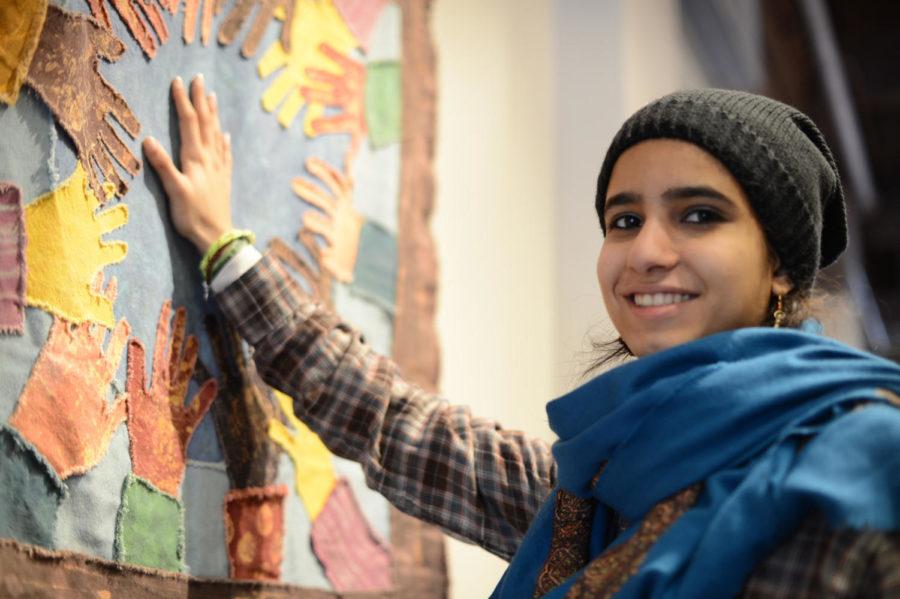Students represent their countries alone
Photo: Huiling Wu/Iowa State Daily
Maisa Al-Wahaibi, freshman in pre-advertising from Oman, places her hand on a bulletin board on Feb. 25 in the multicultural room of the Memorial Union.
February 27, 2013
International students share their struggles and successes despite the difficulty of being the only one representing their country at Iowa State.
Adjusting to college life is difficult for most students but is even more difficult when the student is the only one from their home country and is thrust into a new culture.
Making the decision to study in an unfamiliar country requires a lot of work and financial aid.
Maisa Al-Wahaibi, freshman in pre-advertising from Oman, was raised in California. Al-Wahaibi was able to study in the United States after receiving a merit-based scholarship from the Omani government.
Al-Wahaibi’s decision to study at Iowa State was influenced by her finances.
“Due to not having a clue whether I was going to receive a scholarship or not, I decided to apply to universities that were affordable and offered journalism,” Al-Wahaibi said.
Anicia Peters, an international graduate student from Namibia studying supply chain and information systems, cited scholarships she received for women in science as the reason she was able to study at Iowa State, as well.
Perceptions of the United States influenced the students’ decisions as well.
“I’d never been in the [United States], and I’d never wanted to be in the [United States], actually,” Peters said.
Peters explained that the media coverage of the United States in Namibia and other countries does not present the United States favorably. The media coverage of the United States in Namibia is handled the same way as the media coverage of other countries is covered in the United States. The media often focuses on the negative aspects, Peters said.
Peters has found that “[the] stereotypes aren’t all true.”
Whether the students are in their late teens like Al-Wahaibi or married with children like Peters, the initial adjustment of living in a strange country can be hard.
“The work is overwhelming, and then [the students] have to learn a new culture on top of that,” said Peters.
That difficulty is augmented by the fact that these two students are the only ones from their countries at Iowa State.
“I felt like an endangered and exotic species,” Al-Wahaibi said.
Al-Wahaibi had to adjust to living independently without being able to connect with someone of her own culture.
“I was pretty much alone. I relied on my dad at the beginning when he was here to help me settle,” Al-Wahaibi said.
Even though Peters’ family joined her in the United States shortly after she arrived, she also found adjustment difficult.
“How do you get furniture for free? What’s Goodwill? How do you use a credit card?” Peters said.
In order to create a sense of community for herself and other international students, Peters worked with three other international students to create the International Students Organization.
“We advise them on where they will stay, what they will do, how … they open bank accounts,” Peters said.
In six months, Al-Wahaibi also was able to adjust to school and student life.
“I approached people I felt like speaking to. And living in the dorms makes it a lot easier to create friendships and acquaintances. The floor is like its own little village,” Al-Wahaibi said.
Since there is no one else to relate to their own individual cultures, both students still feel a need to project their culture and customs.
“I gloat about my Arab ethnicity all the time, present my values if I’m in a particular situation, and try my best not to completely erase or diminish the principles and values I was raised on,” Al-wahaibi said.
Peters keeps her culture alive within the club and within her family. It is important to her to share her experiences.
“I think if you’re living outside of your country, you become very much aware of your culture, and you want to share it,” Peters said.







